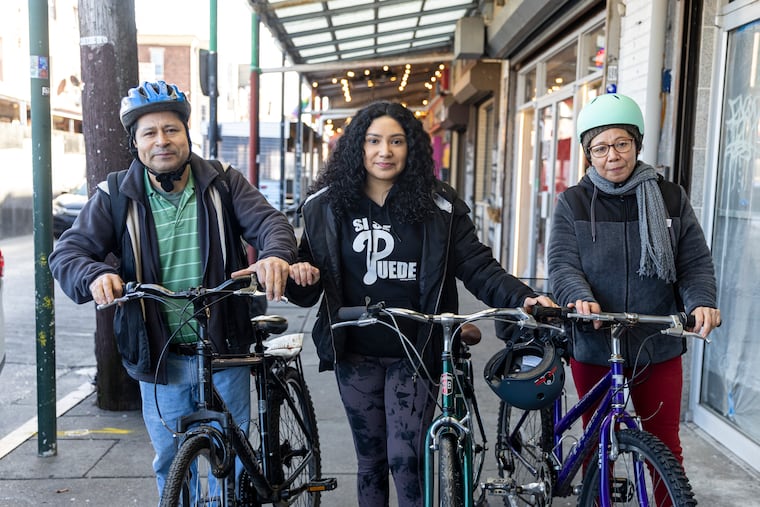For my low-income family, biking is not recreation. ‘It’s survival.’
By taking me around Philadelphia, my bike helped me deliver big promises to my community, and get a full scholarship to the University of Pennsylvania.

My mother calls hers La Poderosa (The Mighty), and I call mine my soulmate. My dad, the most practical among us, calls it his bike.
As a Mexican American immigrant family of three living in South Philadelphia, we are proud owners of three vehicles that fit in the hallway of our humble abode. All of our bikes are mutts with parts from Schwinn, Trek, and Cannondale. My father has become an expert at finding disposed bikes, evaluating them for recyclable parts, and creating constructions that combine the best of the innovation in the bicycle industry. So it is hardly surprising that I treat my two-wheeler as family.
After all, if it were not for my bike, I would have no way of delivering on the big promises I made to my community, and I would have never been admitted last month to the University of Pennsylvania.
How can a bike do all that? Let me explain.
It wasn’t that long ago that I was riding behind my dad in the child seat that he mounted to his bike mere months after my birth. From the back of my dad’s bicycle, I became familiar with the city’s neighborhoods, feeling the bumpy roads near our neighborhood and the perfectly paved surfaces in other, nicer areas, on which our bikes glided effortlessly. Those smooth streets became our favorite Trick-or-Treat destinations on Halloween. That’s where I would fill up my Dora the Explorer book bag with big pieces of candy, a perfect reward for all the pedaling it’d take to get there. On trash days, on those same smoothly paved streets, my dad found all the parts needed to build my mom’s La Poderosa and my soulmate.
But even though all three of us are bike enthusiasts, biking is not recreation for us. It’s survival.
I treat my two-wheeler as family.
My mom rides 40 minutes to her job in a cafe in West Philadelphia, where she works in the kitchen. At the end of a long day on her feet, she bikes another 40 minutes home. She rides not for exercise but because it’s the cheapest mode of transportation. Plus, her bike allows her to come and go on her own schedule and gives her a sense of control. We ride year-round, even in the 100-degree summer heat, the sweat stinging our eyes. We ride our bikes in the rain and snow, dodging the spray of gray slush from passing cars and buses. Each time, we hope we come back alive, not another number in the growing toll of bike riders killed on our city streets.
This is what being a low-income family in the United States looks like.
Two years ago, I parked my bicycle at a community event, then walked into a representative of 215 People’s Alliance, a local collective dedicated to equity building and justice. Despite my parents’ pessimistic view that advocacy cannot change the status quo, I signed up to dedicate most of my summertime to the Alliance’s various causes. That is how I found myself biking to activities across the city — running a community garden with area youth and neighbors (“Growing Together, Creciendo Juntos”), advocating to reinstate paid sick leave in Philly to protect hourly workers, delivering food to families, and registering Black and Latinx voters. If my soulmate had an odometer, it would probably show more than 10,000 miles after all the riding I did over the last two summers.
Getting by on a low income is draining, leaving my parents less time for other things, like helping me prepare for college. Even if my parents had the time, they wouldn’t know where to start navigating this country’s complex higher-education system.
By default, I thought I would attend the Community College of Philadelphia. Then I found TeenSHARP, a college access program, and they served as my de facto college adviser. Their team encouraged me to dream big, and to work really hard for those dreams, even if it required biking all over the city. My soulmate didn’t allow the lack of a car to be an impediment. The bicycle made traveling and connecting with people all over Philadelphia accessible. That’s how I found myself on Penn’s campus during a tour last October, sitting next to Ben on the Bench, daring to dream about my future.
In my application to Penn, I poured out my lived experience, sharing the worldview shaped by biking mile after mile across the poorest big city in the country. Biking opened my eyes to the disparities across Philadelphia. It pushed me to strive for a future where owning a car was economically viable for us. It pushed me to succeed in school, knowing that the path to a car and all of the opportunities it represented were lined with a college degree.
Although so much remains uncertain, I promised my parents I’d construct a life they deserve piece by piece, just the way my father did when building our bicycles. Now, thanks to my recent admission and grant funding that covers 100% of the $85,738 annual cost, I won’t be just a visitor to a nice neighborhood, trick-or-treating or scrounging for discarded bike parts. I’ll be a resident, a student on an elite campus with beautiful walkways.
But I’ll still bring my bike.
Sarahi Franco-Morales is a senior at Science Leadership Academy.
The Philadelphia Inquirer is one of more than 20 news organizations producing Broke in Philly, a collaborative reporting project on solutions to poverty and the city’s push toward economic justice. See all of our reporting at brokeinphilly.org.